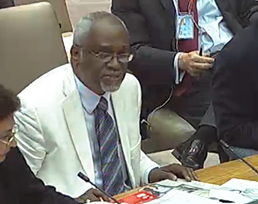| Press Release |
PRESIDENT
|
| (Exclusively for the use of the media. Not an official document) |
|
.
The Hague, 6 June 2011
JKE/MOW/1416e
President Robinson’s Address before the Security Council
 |
| Judge Patrick L. Robinson, ICTY President |
The Tribunal’s President, Judge Patrick Robinson, today addressed the United Nations Security Council on the work of the Tribunal. He described the unprecedented challenges faced by the Tribunal during the past six months, and also the achievements made in the implementation of its completion strategy. In particular the President highlighted the recent arrest of Ratko Mladić as ‘a milestone in the Tribunal’s history’. He outlined the issue of staff retention and enforcement of sentences as areas requiring the support of the Security Council and reiterated his call for the creation of a trust fund for victims of war crimes.
“The Tribunal faced unprecedented challenges, but also achieved unprecedented advancement in the implementation of its completion strategy,” President Robinson said.
During the reporting period, nine trials were conducted concurrently thanks to the “doubling-up [of] Judges and staff so that they were working on more than one case at a time”. The Đorđević trial and the Gotovina et al. trial were brought to a close, while the Perišić trial is anticipated to be completed this year. Six trials are anticipated to conclude in 2012, and the Karadžić trial should be completed in 2014.
“The Tribunal continues to take all measures possible to expedite its trials without sacrificing due process”, President Robinson said.
The President explained that a “staffing crisis” in the Appeals Chamber, with staff diverted to the Trial Chambers, has led to revisions in the estimated times for the completion of all appeal proceedings. In order to counterbalance these revised estimates, and expedite proceedings, the President detailed a variety of efficiency measures being taken.
The President highlighted staff attrition as one of three areas in which the Tribunal needs the support of the Security Council. He described the staffing problem as “chronic, systemic and endemic” and urged Member States to support meaningful steps to address this issue.
“The Security Council, the Tribunal’s parent body, must heed the call for action. We need your influence and support if we are to complete the work with which you have tasked us. And I must be blunt: if something is not done to alleviate the staffing crisis, the Tribunal will be forever reporting slippages in its work schedule,” the President said.
The President indicated the establishment of a trust fund for victims as the second area in which the Tribunal needs the Security Council’s assistance, underlining that victims of the conflicts of the former Yugoslavia have a right to compensation under international law for the crimes committed against them. In this regard, he noted initiatives that the Tribunal has been undertaking to have established some system for providing assistance and support to victims, and called upon the Security Council to support these initiatives, stressing that they would be funded by voluntary contributions. He stated that ‘the Tribunal cannot, through the rendering of its Judgements alone, bring peace and reconciliation to the region. Other remedies should complement the criminal trials if lasting peace is to be achieved, and one such remedy should be adequate reparations to the victims for their suffering’.
The President then identified the enforcement of sentences as the third area in which the Tribunal requires the support of the Security Council. He highlighted that up to 40 additional sentences may have to be enforced over the next few years, depending on the outcome of trials and appeals, and that the Tribunal’s current enforcement capacity is rapidly approaching its limit. The President called on Member States to enter into enforcement agreements with the Tribunal in order to ensure that the enforcement of sentences, an “integral part of the criminal justice system”, can be secured and the Tribunal’s mission completed.
In closing, the President stressed that the Tribunal has “kept faith with the vision of the Security Council”. He called on the Security Council “to reciprocate that faith and give us the support that we desperately need to complete the work that the Security Council started”.
Every six months, the President and Prosecutor submit to the Security Council their assessments on the progress made towards implementation of the completion strategy of the Tribunal in accordance with Resolution 1534. The reports set out the measures that have been taken and that remain to be taken in order to complete the work of the Tribunal.
The latest completion strategy report highlights that of the nine trials for which proceedings were ongoing during the reporting period, two cases were brought to a close. A further trial is expected to conclude this year. Six trials are anticipated to conclude in 2012 and the case of Radovan Karadžić is expected to be completed in 2014.
Additionally, the President submits an Annual Report to the UN Security Council and General Assembly. The Annual Report, usually submitted in November, covers the 12-month period of 1 August to 31 July and includes an overview of activities of all sections of the Tribunal.
Since its inception 18 years ago, the Tribunal has indicted 161 persons for war crimes committed on the territory of the former Yugoslavia. The proceedings against 126 individuals have been completed. Only one indictee, Goran Hadžić remains at large.
***
The full text of the President's speech can be found at:
The latest Completion Strategy Report can be found at:
In English
In French
An archive of Strategy Reports from previous years
An archive of all speeches made by the Tribunal’s principals
*****
International Criminal Tribunal for the former Yugoslavia
For more information, please contact our Media Office in The Hague
Tel.: +31-70-512-8752; 512-5343; 512-5356 Fax: +31-70-512-5355 - Email: press [at] icty.org
Follow ICTY on Twitter and Youtube

